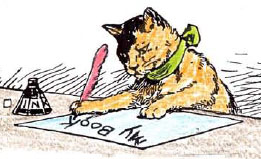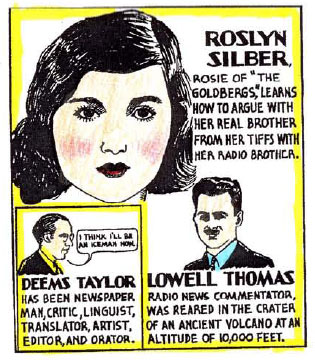|

This story was published in Radio Recall, the journal of the Metropolitan Washington Old-Time Radio Club, published six times per year.
Click here to return to the index of selected articles.
|
|
 THOSE OTR BOOK TITLES THOSE OTR BOOK TITLES
(A Discourse on Naming Rights)
by Jim Cox © 2009
(From Radio Recall,
October 2009)
What we call our vintage radio books is a matter of intriguing interest to me.
Some titles are cute, clever, funny or fascinating: From Ma Perkins to Mary Hartman (Robert LaGuardia); I Have a Lady in the Balcony (George Ansbro); Private Eyelashes (Jack French); Sunday Nights at Seven (Jack, Joan Benny); Tune in Yesterday (John Dunning).
Some works beget sequels: Archives of the Airwaves, Vols. 1-10 (Roger C. Paulson); Encyclopedia of American Radio, 1920-1960, Vols. 1-2 (Luther F. Sies); Whatever Became Of …? with at least 11 volumes (Richard Lamparski).
Some titles tell in no uncertain terms what’s inside: Don McNeill and His Breakfast Club (John Doolittle); The Great Radio Comedians (Jim Harmon); The Great Radio Heroes (Harmon); Great Radio Personalities in Historic Photographs (Anthony Slide); Radio Programs, 1924-1984 (Vincent Terrace); Modern Radio Advertising (Charles Hull Wolfe); Radio Crime Fighters (Jim Cox); Those Radio Commentators! (Irving E. Fang).
Some handles seem to play peek-a-boo with readers, revealing precious little: Cat Whiskers and Talking Furniture (John Rayburn); Don’t Touch That Dial! (J. Fred MacDonald); The Image Empire (Erik Barnouw); Listening In (Susan J. Douglas); Radio by the Book (Tim DeForest); Sound and Fury (Francis Chase, Jr.); Stay Tuned (Christopher H. Sterling, John M. Kittross); A Tower in Babel (Barnouw).
In Radioland, we love to include anything that references gold in our titling and subtitling: The Big Broadcast, 1920-1950—A New, Revised, and Greatly Expanded Edition of Radio’s Golden Age (Frank Buxton, Bill Owen); The Golden Age of Radio (J. David Goldin); Golden Throats & Silver Tongues (Ray Poindexter); The Golden Web (Barnouw); The Golden Years of Broadcasting (Robert Campbell); The Great American Broadcast—A Celebration of Radio’s Golden Age (Leonard Maltin); Handbook of Old-Time Radio—A Comprehensive Guide to Golden Age Radio Listening and Collecting (Jon D. Swartz, Robert C. Reinehr); The Mighty Music Box—The Golden Age of Musical Radio (Thomas A. DeLong); Radio’s Golden Age (Buxton, Owen); Radio’s Golden Years (Frank Bresee, Bobb Lynes); A Resource Guide to the Golden Age of Radio (Susan, David S. Siegel); The Rise of Radio—from Marconi through the Golden Age (Alfred Balk); Sold on Radio—Advertisers in the Golden Age of Broadcasting (Cox); Speaking of Radio—Conversations with the Stars of the Golden Age of Radio (Chuck Schaden).
Some works go for pithy identifications: David Sarnoff, A Biography (Eugene Lyons); The Deejays (Arnold Passman); Gang Busters (Martin Grams, Jr.); Information, Please (Grams); Quiz Craze (DeLong); Radio Drama (Grams); Radio Sound Effects (Robert L. Mott); Radio Stars (DeLong); The Serials (Raymond William Stedman); The Soaps (Madeleine Edmondson, David Rounds).
Others take a while longer—much longer—to devour: with 15 words in titles and subtitles … The Third Revised Ultimate History of Network Radio Programming and Guide to All Circulating Shows (Jay Hickerson) and also Those Wonderful, Terrible Years—George Heller and the American Federation of Television and Radio Artists (Rita Morley Harvey); with 17 words … In All His Glory—The Life of William S. Paley, the Legendary Tycoon and His Brilliant Circle (Sally Bedell Smith); with 23 words … History of Broadcasting: Radio to Television—A Thirty-Year History of Programs Carried on National Radio Networks in the United States 1926-1956 (Harrison B. Summers, editor.)
Longer titles include: with 25 words... Tune in Tomorrow—Or How I Found The Right to Happiness with Our Gal Sunday, Stella Dallas, John’s Other Wife, and Other Sudsy Radio Serials (Mary Jane Higby); with 30 words … A Pictorial History of Radio—The Complete Story of Radio Broadcasting in America from Crystal Sets to Transistors with All the Stars, All the Great Shows of Radio’s Golden Age (Irving Settel); with 31 words … Radio Speakers—Narrators, News Junkies, Sports Jockeys, Tattletales, Tipsters, Toastmasters and Coffee Klatch Couples Who Verbalized the Jargon of the Aural Ether from the 1920s to the 1980s—A Biographical Dictionary (Cox); and the unassailable champ of verbosity with 67 words … Raised on Radio—In Quest of The Lone Ranger, Jack Benny, Amos ‘n’ Andy, The Shadow, Mary Noble, The Great Gildersleeve, Fibber McGee and Molly, Bill Stern, Our Miss Brooks, Henry Aldrich, The Quiz Kids, Mr. First Nighter, Fred Allen, Vic and Sade, The Cisco Kid, Jack Armstrong, Arthur Godfrey, Bob and Ray, The Barbour Family, Henry Morgan, Joe Friday, and Other Lost Heroes from Radio’s Heyday (Gerald Nachman).
I don’t know how much sway OTR authors have with their publishers in titling books. With some of the smallest outfits I suspect they might have quite a lot. And of course, those who self-publish have total control about what goes on a cover, including name and illustration. I can speak of my experience with just two presses, McFarland and Scarecrow. I had no “say” with Scarecrow and McFarland reminds its authors that covers are the prerogative of the publisher.
But I’m simultaneously asked for suggested titles with every tome I submit. In the early years my ideas habitually fell on blind eyes. As time elapsed, I either wore the editors down or they decided I sufficiently “got better” at the name game. Without much difficulty I branded The Great Radio Audience Participation Shows (it took little imagination due to content and the fact it arrived on the heels of The Great Radio Soap Operas).
I was taken aback, however, when my mentors felt my recommendation of Frank and Anne Hummert’s Radio Factory was apropos. Later I proposed main titles of The Daytime Serials of Television, The Great Radio Sitcoms, Music Radio and Radio Speakers (as well as all those words in the long string that followed, the editors gritting their teeth while allowing, “We’ve never done anything like this before!” referring to the protracted subtitle).
Not quite everything worked out like I hoped in my quest to be a title-scribe. When I submitted a book focused on 1950s radio, I proposed that it be labeled Sunset on the Ether—Network Radio’s Grand Finale. It wasn’t. At a late date, virtually coinciding with its release, I learned it had been designated as Say Goodnight, Gracie—The Last Years of Network Radio.
I saw problems coming. Keep in mind that the first three words of the appellation comprise the handle that dominates the space in catalogues, reviews, online library listings, promotion—just about everywhere. The second line is just that and may be deleted by some sources or make little impact on readers. I couldn’t begin to guess how many people have inquired about my volume on George and Gracie. They usually seem utterly dismayed and possibly even annoyed when told it isn’t about the Burns clan.
Sometimes “you can’t tell a book by its cover,” an old adage proffers. I know of one that qualifies as Exhibit A.

The above illustration is one of many in the 1932 book "Radio Round-Ups" complied by Gurman and Slager. It consisted of biographical information and unusual facts (some of them true) regarding these new stars. NOTE: Our thanks.to Derek Tague for rescuing this book, discarded by NYC Library.
|